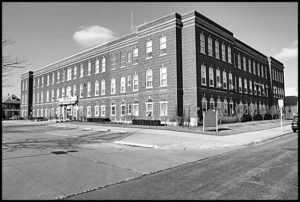City is spilling red ink, financially speaking

City officials will have their work cut out for them in the coming year as they tackle a huge financial challenge.
By Charles Sercombe
The title for this year’s budget review painted a fairly grim financial picture of the city.
It is called:
“A tale of one city: The worst of times, and the worst of times.”
From there, at last Tuesday’s budget work session, the overview only got worse. However, three city councilmembers were not in attendance to hear the bad news.
Those absent were Councilmembers Mohammed Hassan, Khalil Refai and Adam Albarmaki. Hassan is no stranger to the city’s budget process, having sat through a number of such reviews while serving on council over the past few years.
Refai and Albarmaki are brand new members, and had not yet experienced a budget session.
The overview basically laid out a pattern of declining revenue streams since 2003.
For instance, income tax collection has gone down — despite the city experiencing a surge in population, from about 22,000 to over 28,000, in the last 10 years.
The report said that, in 2003, the city collected over $2.7 million, while in the year 2020, it was a little over $2.6 million.
While the city’s budget remained at about $16 million since 2003, state revenue sharing shrunk from $4.5 million to $3.2 million.
It is the same story with property tax collection, which is the bulk of where the city gets its money to operate. In 2003, the city collected $7.1 million, but by 2020, it was down to $6.8 million.
The bad news was not unexpected. The city has been in deficit spending for the past two years, and at the rate it’s going, the budget surplus will run out during this fiscal year, which ends June 30.
At the same time, city expenses across the board continue to increase.
Most of the city’s budget goes toward employee payroll and the pension obligations, which are technically underfunded and heading toward default.
Last August, in the primary election, the city attempted to get voter-approval of a special property tax millage that would have paid the pension obligation for police officers and firefighters, but that was overwhelmingly rejected.
What that could – and likely will – lead to is the city failing to meet its pension payments. If that’s the case, it’s expected that retirees would file a lawsuit against the city.
That, in turn, would likely lead to a judge imposing a special tax on property rolls to cover the expense. In other words, either way, homeowners are going to have to pay up.
The Review asked newly-elected Mayor Amer Ghalib about his thoughts of the initial budget presentation, and whether he had any ideas for savings or for increasing revenues.
In his campaign, he said he had “bold’ ideas on a number of pressing city issues, but no specifics were ever offered.
Ghalib replied (via email): “Look, during my campaign, I didn’t make false promises, or timeline to when will things be fixed. What developed over tens of years cannot be fixed in a few months. I’m sure you know that too.
“However, there are some decisions and changes on the way that will benefit our city on the short and long terms. We will not announce it until it’s the right time. I’m still working with the former mayor’s team and administration, and I may continue to work with them if things work out in our city’s favor.”
The council and mayor will meet on March 1 to continue the budget overview.
Posted Feb. 11, 2022

